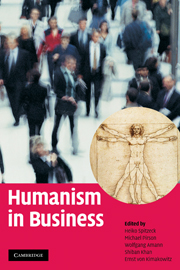Book contents
- Frontmatter
- Contents
- List of figures
- List of tables
- List of editors and contributors
- Acknowledgements
- Humanistic Management Network: paving the way towards a life-serving economy
- Introduction
- Part 1 Philosophic-historical grounding of humanism
- Part 2 Towards an integration of humanism and business on a systems level
- Part 3 Humanistic management
- Part 4 The individual as a change agent for a humane business society
- 19 Ethical codes at work
- 20 The daunting challenges of globalization and the power of individuals in cross-stakeholder networks for a humanistic face of globalization
- 21 The leader as responsible change agent: promoting humanism in and beyond business
- 22 Quiet leadership – a way to sustainable positive change
- 23 Everyone a changemaker: social entrepreneurship's ultimate goal
- 24 Social business entrepreneurs are the solution
- 25 Concluding observations
- Index
24 - Social business entrepreneurs are the solution
Published online by Cambridge University Press: 25 January 2011
- Frontmatter
- Contents
- List of figures
- List of tables
- List of editors and contributors
- Acknowledgements
- Humanistic Management Network: paving the way towards a life-serving economy
- Introduction
- Part 1 Philosophic-historical grounding of humanism
- Part 2 Towards an integration of humanism and business on a systems level
- Part 3 Humanistic management
- Part 4 The individual as a change agent for a humane business society
- 19 Ethical codes at work
- 20 The daunting challenges of globalization and the power of individuals in cross-stakeholder networks for a humanistic face of globalization
- 21 The leader as responsible change agent: promoting humanism in and beyond business
- 22 Quiet leadership – a way to sustainable positive change
- 23 Everyone a changemaker: social entrepreneurship's ultimate goal
- 24 Social business entrepreneurs are the solution
- 25 Concluding observations
- Index
Summary
Capitalism is interpreted too narrowly
Many of the problems in the world remain unresolved because we continue to interpret capitalism too narrowly. In this narrow interpretation, we then create a one-dimensional human being to play the role of entrepreneur. We insulate him from other dimensions of life, such as the religious, the emotional, the political, and the social. He is dedicated to one mission in his business life: maximizing profit. Masses of one-dimensional human beings support him by backing him with their investment money to achieve the same mission. The free-market game, we are told, works out beautifully with one-dimensional investors and entrepreneurs. Have we been so mesmerized by the success of the free market that we don't dare to question it? Have we worked so hard at transforming ourselves absolutely into one-dimensional human beings – as conceptualized in economic theory – to facilitate the smooth functioning of the free-market mechanism?
Economic theory postulates that you contribute to society and the world in the best possible manner when you concentrate on squeezing out the maximum for yourself. Once you get your maximum, everybody else will get theirs too. As we follow this policy, we sometimes begin to doubt whether we are doing the right thing by imitating the entrepreneur created by theory. After all, things don't look too good around us.
- Type
- Chapter
- Information
- Humanism in Business , pp. 402 - 412Publisher: Cambridge University PressPrint publication year: 2009
- 14
- Cited by

